How Parkinson’s Affects Mental Health: Anxiety, Depression, and Stress
Introduction
When people think of Parkinson’s disease (PD), the first image that comes to mind is often tremors, stiffness, or slowness of movement. But behind those visible symptoms lies another, often hidden side of the disease—its impact on mental health. Parkinson’s doesn’t just affect muscles; it also changes how the brain regulates mood, stress, and motivation.
For many living with Parkinson’s, emotional symptoms like anxiety, depression, and chronic stress can be as challenging as the physical ones. They can make daily life harder, complicate treatment, and take a toll on relationships and quality of life.
Understanding why these emotional changes occur—and learning how to manage them—is essential for a more holistic approach to Parkinson’s care.
In this article, we’ll explore the connection between Parkinson’s and mental health, explain what causes anxiety and depression in PD, and discuss evidence-based strategies for emotional balance, including lifestyle support, supplements, and therapy. 🌿
Looking for supplements for This? Click here.
Understanding the Brain Changes Behind Parkinson’s
Parkinson’s disease is a neurodegenerative disorder primarily affecting the brain’s dopaminergic neurons—cells responsible for producing dopamine. Dopamine is a neurotransmitter that plays a vital role in movement, mood regulation, and reward processing.
When these neurons degenerate, dopamine levels drop, leading not only to movement issues but also to mood disturbances. However, Parkinson’s affects more than just dopamine. It also disrupts other chemical messengers, including serotonin, norepinephrine, and acetylcholine, all of which contribute to emotional regulation and stress response.
This biochemical imbalance explains why people with Parkinson’s may experience:
💭 feelings of sadness or apathy
💫 difficulty experiencing pleasure (anhedonia)
😟 chronic anxiety or restlessness
🌙 sleep disturbances and fatigue
In short, Parkinson’s alters the neurochemistry that keeps your emotions steady and your motivation strong.
The Psychological Weight of a Parkinson’s Diagnosis 💔
A Parkinson’s diagnosis can trigger a profound emotional reaction. Many individuals experience grief, fear, and uncertainty as they adjust to the idea of a progressive condition.
Common emotional responses include:
Shock and denial: “This can’t be happening to me.”
Fear of dependence: Worrying about losing autonomy or becoming a burden.
Identity changes: Difficulty accepting limitations or altered roles in relationships.
Hopelessness: Feeling like the future is out of one’s control.
These psychological stressors compound the biological changes, creating a feedback loop where stress worsens symptoms, and worsening symptoms increase stress.
The Role of Dopamine in Emotional Health 🌿

Dopamine isn’t just about movement—it’s the neurochemical of motivation, joy, and reward.
When dopamine levels fall, it can cause:
Loss of interest or drive: Tasks that used to bring pleasure feel empty.
Emotional flatness: Reduced ability to express or feel emotion.
Anxiety and restlessness: The brain’s way of compensating for chemical imbalance.
Medications like levodopa help restore dopamine, but their effects can fluctuate, leading to “on-off” periods where emotional stability comes and goes with medication cycles.
This biochemical instability can make emotional regulation difficult, leaving people vulnerable to anxiety and depression even when physical symptoms are under control.
Anxiety in Parkinson’s: More Than Just Worry 😟
Anxiety is one of the most common non-motor symptoms of Parkinson’s, affecting up to 40% of people with the disease.
Unlike typical situational anxiety, Parkinson’s-related anxiety often stems from:
Biological causes: Imbalances in serotonin and dopamine.
Medication fluctuations: Anxiety rising during “off” periods when dopamine drops.
Fear of symptoms: Worry about tremors, falls, or public embarrassment.
Anxiety can manifest as:
💓 rapid heartbeat or shortness of breath
💭 racing thoughts or panic attacks
🌙 insomnia and restlessness
😔 avoidance of social interactions
It’s not “just in your head”—it’s a neurological symptom of Parkinson’s. Recognizing it as such helps remove stigma and opens the door to effective treatment.
Depression in Parkinson’s: A Chemical and Emotional Challenge 🌧️
Depression affects about half of all people with Parkinson’s, and it’s not simply a reaction to illness. It’s a biochemical feature of the disease itself.
The combination of dopamine and serotonin depletion makes it harder for the brain to regulate mood. Additionally, inflammation and oxidative stress—both present in Parkinson’s—can interfere with neurotransmitter synthesis.
Depression in PD can appear as:
Persistent sadness or emptiness
Loss of pleasure in daily activities
Low motivation or fatigue
Feelings of guilt or worthlessness
Poor concentration or decision-making difficulties
Left untreated, depression can worsen physical symptoms and reduce adherence to treatment, creating a cycle of decline.
Stress and the Parkinson’s Connection ⚡
Chronic stress has a significant impact on Parkinson’s progression. The stress hormone cortisol increases oxidative stress, damages neurons, and worsens inflammation—all processes that accelerate neurodegeneration.
People with Parkinson’s often find that stress:
💫 increases tremors
💓 worsens stiffness or muscle pain
🌙 disrupts sleep
💭 heightens anxiety or emotional volatility
This means that stress management isn’t optional—it’s a therapeutic necessity.
Supporting Mental Health: An Integrative Approach 🌿
While Parkinson’s is a lifelong condition, there are many ways to support emotional health. A combination of medication, therapy, supplements, and lifestyle changes can help reduce anxiety, depression, and stress—improving quality of life and emotional balance.
Therapy for Emotional Regulation 🧠💬
Therapy provides tools for coping with the emotional complexity of Parkinson’s.
Effective approaches include:
Cognitive Behavioral Therapy (CBT): Helps challenge negative thought patterns.
Mindfulness-Based Stress Reduction (MBSR): Teaches relaxation and present-moment awareness.
Support groups: Offer shared understanding and reduce feelings of isolation.
Acceptance and Commitment Therapy (ACT): Encourages acceptance of limitations while pursuing meaningful goals.
Therapy helps reframe the emotional narrative—from fear to adaptability.
Looking for online therapy ? Click Here.
Medication Adjustments 💊
Sometimes, mood instability stems from dopamine fluctuations. Neurologists can adjust Parkinson’s medication timing or dosage to stabilize mood.
Additionally, certain antidepressants (SSRIs or SNRIs) can help rebalance serotonin and norepinephrine levels. However, careful monitoring is needed to avoid interactions with PD medications.
Supplements for Emotional Support 🌸
Supplements are not a replacement for medication, but they can provide powerful biochemical support.
Here are some that may help:
Omega-3 Fatty Acids
Reduce inflammation, improve brain membrane fluidity, and support serotonin signaling.
🧠 May ease depression and improve cognitive function.
Magnesium Glycinate
Calms the nervous system, supports GABA, and reduces cortisol.
🌙 Helps with stress, sleep, and anxiety.
CoQ10 (Coenzyme Q10)
Supports mitochondrial energy and antioxidant defense.
⚡ Protects neurons from oxidative damage and may slow disease progression.
Vitamin D3
Regulates serotonin synthesis and supports mood balance.
☀️ Deficiency is linked to depression and fatigue.
B-Complex Vitamins (especially B6, B9, and B12)
Support dopamine and serotonin synthesis, energy metabolism, and stress resilience.
🌿 Essential for mental clarity and emotional stability.
Curcumin (Turmeric Extract)
Anti-inflammatory and neuroprotective; enhances mood and reduces oxidative stress.
🌼 Supports brain health and emotional calm.
Exercise: Nature’s Antidepressant 🏃💪
Exercise is one of the most powerful therapies for Parkinson’s—physically and mentally.
It boosts dopamine release, reduces inflammation, and promotes endorphins and brain-derived neurotrophic factor (BDNF), which supports neuron repair.
Great options include:
Walking or cycling
Tai Chi and yoga
Dance therapy (especially Parkinson’s-focused programs)
Swimming or water aerobics
Consistency matters more than intensity—movement itself is medicine.
Mind-Body Practices 🌬️🧘
Chronic stress is both a cause and consequence of Parkinson’s symptoms. Mind-body practices calm the nervous system and restore balance.
Effective options include:
🌿 Breathwork: Deep diaphragmatic breathing lowers cortisol.
🌙 Meditation: Reduces anxiety and increases emotional resilience.
🌸 Progressive muscle relaxation: Relieves tension and improves sleep.
💫 Gratitude journaling: Shifts focus from fear to appreciation.
Practicing these daily helps your body relearn safety and calm.
Want to try Breathwork? Click Here.
Sleep and Circadian Rhythm 🌙
Sleep problems are common in PD due to changes in brain chemistry and medication side effects. Poor sleep worsens depression, fatigue, and cognitive function.
To improve sleep:
🌜 Maintain a consistent bedtime routine.
🕯️ Limit caffeine and screens in the evening.
🛏️ Supplement with melatonin if needed (under doctor supervision).
🌿 Use magnesium or L-theanine to calm the mind before bed.
The Role of Social Connection 💞
Isolation intensifies anxiety and depression. Building supportive relationships—whether through friends, family, or PD support groups—can dramatically improve emotional well-being.
Social engagement provides:
💬 shared understanding
🌿 laughter and distraction
💗 reduced loneliness
🧠 cognitive stimulation
If mobility or speech difficulties make connection hard, online groups and therapy apps can help bridge the gap.
Hope and Resilience 🌟
While Parkinson’s can change the brain, it doesn’t have to define your spirit. Many people find that their journey leads to new forms of strength, creativity, and emotional depth.
Healing is not about erasing the diagnosis—it’s about learning to live with balance, purpose, and self-compassion.
Your mind and body are connected. When you care for both, you empower your brain’s ability to adapt, recover, and keep hope alive. 🌿
References 📚
Chaudhuri, K. R., & Schapira, A. H. (2009). Non-motor symptoms of Parkinson’s disease: Dopaminergic pathophysiology and treatment. The Lancet Neurology.
Aarsland, D. et al. (2012). Depression in Parkinson’s disease: Epidemiology, mechanisms, and management. Nature Reviews Neurology.
Richard, I. H. (2007). Anxiety disorders in Parkinson’s disease. Advances in Neurology.
Fahn, S. (2015). Parkinson disease, the effect of levodopa, and the Evolving concept of dopamine deficiency. Nature Clinical Practice Neurology.
Helmich, R. C. et al. (2013). Stress and anxiety in Parkinson’s disease: Neural mechanisms and clinical implications. Nature Reviews Neurology.
Related Posts
-
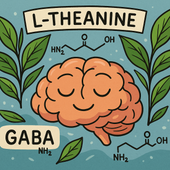
L-Theanine and GABA: Natural Calm for Parkinson’s-Related Anxiety
Anxiety in Parkinson’s often feels overwhelming — a constant inner tension that affects both body and mind. 🌿 This article explores how L-theanine and GABA, two natural compounds that promote relaxation without sedation, can help restore balance, ease restlessness, and calm the nervous system for a more peaceful state of mind. 🌙
-
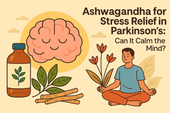
Ashwagandha for Stress Relief in Parkinson’s: Can It Calm the Mind?
Ashwagandha, the ancient Ayurvedic adaptogen, may offer powerful stress relief for people with Parkinson’s. 🌿 By regulating cortisol, calming the nervous system, and supporting dopamine balance, this natural herb helps ease anxiety, improve sleep, and promote emotional stability — restoring calm from the inside out. 🌙
-
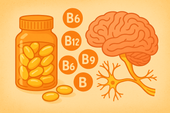
B Vitamins for Mood and Nerve Health in Parkinson’s Patients
B vitamins play a vital role in protecting the brain and nervous system in Parkinson’s. 🌿 From supporting dopamine production to reducing homocysteine and improving mood, these essential nutrients — especially B6, B9, and B12 — help stabilize emotions, boost energy, and preserve nerve integrity for better daily function and mental clarity. 💫
-
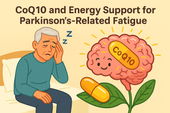
CoQ10 and Energy Support for Parkinson’s-Related Fatigue
Fatigue in Parkinson’s goes far beyond tiredness — it’s a deep cellular exhaustion. ⚡ CoQ10, a natural compound essential for energy production, may help restore vitality by supporting mitochondrial function and protecting brain cells from oxidative stress. Discover how CoQ10 can enhance energy, reduce fatigue, and improve overall resilience in Parkinson’s. 🌿
-
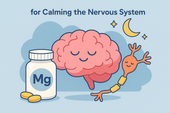
Magnesium for Calming the Nervous System in Parkinson’s
Magnesium is one of the most underrated allies for people with Parkinson’s. 🌿 This calming mineral supports the brain, relaxes tense muscles, and stabilizes the nervous system, helping reduce anxiety, restlessness, and sleep problems. Discover how magnesium nourishes dopamine pathways, protects neurons, and restores a sense of inner peace from within. 💫
-
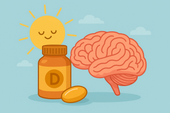
Vitamin D and Mental Health in Parkinson’s: Why Deficiency Matters
Vitamin D is more than a sunshine nutrient — it’s a key player in brain health and emotional balance for people with Parkinson’s. 🌞 This article explores how vitamin D influences dopamine, serotonin, and inflammation, and why deficiency can worsen depression, anxiety, and cognitive decline. Discover how restoring healthy levels can bring clarity, calm, and resilience back to daily life. 🌿
-

Omega-3s and Parkinson’s: Supporting Mood and Cognitive Clarity
Omega-3 fatty acids are among the most powerful nutrients for supporting brain health and emotional well-being in people with Parkinson’s. 🧠 This article explores how omega-3s strengthen neuronal membranes, improve dopamine and serotonin signaling, reduce inflammation, and promote cognitive clarity. Learn how these essential fats can help ease anxiety, lift mood, and protect your mind from oxidative stress naturally. 🌿
-
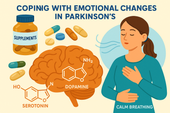
Coping with Emotional Changes in Parkinson’s: Supplements That Support Balance
Emotional changes like anxiety, depression, and irritability are common yet often overlooked symptoms of Parkinson’s disease. This article explores how supplements such as omega-3s, magnesium, and vitamin D can support mood regulation, while therapy and breathwork techniques help restore calm and emotional balance naturally. 🌿
-
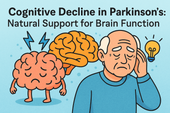
Cognitive Decline in Parkinson’s: Natural Support for Brain Function
Cognitive decline in Parkinson’s can affect memory, focus, and daily independence—but there’s hope. Understanding how the disease impacts brain chemistry opens the door to natural ways of support. From omega-3s and CoQ10 to mindfulness and exercise, you can nourish your brain, boost clarity, and slow decline through holistic care. 🌿🧠
-

How Supplements Can Support Therapy and Healing from Co-Dependency
Biology is the science of life—an exploration of how cells, systems, and molecules create the foundation for every thought, emotion, and heartbeat. From the way our DNA shapes us to how hormones and neurons communicate, biology reveals the deep interconnectedness between mind and body. Understanding it helps us appreciate the delicate balance that keeps us alive, aware, and evolving. 🌿🧬
-
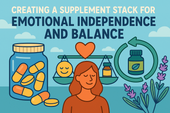
Creating a Supplement Stack for Emotional Independence and Balance
Biochemistry is the invisible language of life—how molecules, cells, and systems communicate to keep your body and mind in balance. From neurotransmitters shaping emotions to enzymes fueling energy, every process in your body reflects biochemical harmony. Understanding these reactions helps you see how nutrition, supplements, and emotions intertwine to support health, mood, and resilience. ⚗️🌿
-
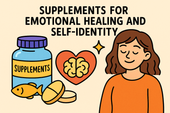
Supplements for Supporting Emotional Healing and Self-Identity
Biology is the bridge between mind and body—the science that explains how cells, hormones, and systems communicate to sustain life. It reveals how emotional states influence physical health, and how nourishment, rest, and movement keep us in balance. Understanding biology helps us reconnect with our natural intelligence and live in harmony with ourselves and the world. 🌿🔬
-
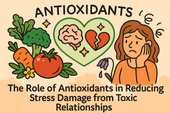
The Role of Antioxidants in Reducing Stress Damage from Toxic Relationships
Biology is the study of life in motion—the intricate dance between cells, systems, and the natural world. From DNA replication to neurotransmitter flow, every process in the human body reflects the intelligence of life adapting and evolving. Understanding this harmony helps us appreciate how nutrition, stress, and environment shape our health and emotional balance. 🌿🔬
-
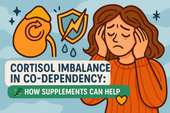
Cortisol Imbalance in Co-Dependency: How Supplements Can Help
Cortisol is the body’s main stress hormone—essential for energy and focus, yet harmful when chronically elevated. When life feels like constant pressure, cortisol imbalance can trigger fatigue, anxiety, and mood swings. Learning how to restore balance through rest, nutrition, and the right supplements can help you rebuild calm, clarity, and resilience from the inside out. 🌿💫
-
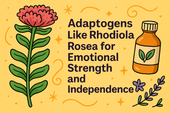
Adaptogens Like Rhodiola Rosea for Emotional Strength and Independence
Adaptogens are nature’s stress-balancing herbs—plants like Rhodiola, Ashwagandha, and Holy Basil that help your body adapt to emotional and physical pressure. They don’t numb or overstimulate; they teach your system how to find calm and stability again. By restoring balance to your hormones, energy, and mood, adaptogens nurture emotional resilience and grounded strength. 🌿✨
-
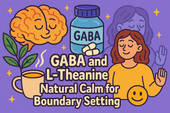
GABA and L-Theanine: Natural Calm for Boundary Setting
Anxiety can feel like a storm inside your mind—constant tension, overthinking, and the inability to relax even when you’re safe. But beneath the chaos, your body is simply trying to protect you. Learning to calm anxiety starts with understanding how your brain and nervous system respond to stress—and how to gently guide them back to peace. 🌿💫
-
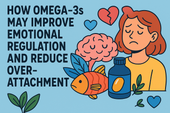
How Omega-3s May Improve Emotional Regulation and Reduce Over-Attachment
Inflammation isn’t just about sore joints or fatigue—it’s also a hidden driver of mood swings, anxiety, and emotional burnout. When chronic stress or poor diet keep the body inflamed, the brain’s chemistry changes, making calm harder to access. Learning how to reduce inflammation through nutrition, rest, and mindful living helps restore balance from the inside out. 🌿💫
-
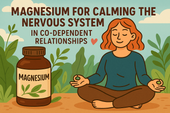
Magnesium for Calming the Nervous System in Co-Dependent Relationships
The nervous system is the body’s communication network, linking your mind and organs through a delicate web of electrical signals. It controls everything from emotional responses to muscle movement—and when it’s overwhelmed by chronic stress or anxiety, balance is lost. Learning how to calm and nourish your nervous system through nutrition, mindfulness, and rest can restore peace and emotional stability. 🌿💫
-

Ashwagandha and Co-Dependency: Supporting Stress Resilience
Stress is more than a feeling—it’s a full-body signal that your system is overwhelmed. When the mind races and the body tenses, your hormones, breathing, and focus all shift into survival mode. Chronic stress doesn’t just affect emotions—it reshapes your nervous system, drains your energy, and clouds your clarity. Learning to understand and manage stress gently is the first step toward peace, balance, and true recovery. 🌿💫
-

Why Co-Dependency Feels Draining: Adrenal Fatigue and Supplements That Help
The adrenal glands are small but powerful organs that sit above your kidneys, acting as your body’s built-in stress managers. They produce hormones like cortisol and adrenaline that help regulate energy, mood, and resilience. When they’re overworked from chronic stress or emotional exhaustion, fatigue and imbalance follow. Supporting adrenal health naturally can help restore calm, energy, and hormonal balance. 🌿⚡
-

The Link Between Anxiety, Co-Dependency, and Natural Support
Anxiety feels like living in constant alert mode—your heart races, your thoughts loop, and your body can’t find peace. It’s the nervous system’s way of preparing for danger, even when none exists. Understanding what’s happening in your mind and body is the first step toward calming the storm and restoring balance. 🌿💫
-

Supplements That Support Dopamine and Serotonin in Co-Dependent Patterns
Serotonin is the neurotransmitter of calm, confidence, and contentment. When it’s balanced, you feel peaceful and emotionally grounded. When it’s low, anxiety, mood swings, and emotional dependence take over. By understanding serotonin’s role in emotional health—and how to support it naturally—you can rebuild inner stability, improve relationships, and cultivate lasting happiness from within. 🌞💫
-

How Emotional Exhaustion in Codependency Impacts the Nervous System
The nervous system is the body’s communication network, connecting the brain to every organ and muscle. It regulates stress, mood, and emotion through a delicate balance of electrical and chemical signals. When overwhelmed, it can become dysregulated—leading to fatigue, anxiety, and emotional imbalance. Understanding how to calm and strengthen the nervous system is key to healing from chronic stress and emotional burnout. ⚡🌿
-

What Is Co-Dependency? The Role of Brain Chemistry and Stress
Stress is more than a feeling—it’s a full-body experience that begins in the brain and ripples through every cell. When cortisol surges and the nervous system stays on alert, your body can’t rest or recover. Over time, this constant tension affects energy, focus, mood, and even immune health. Understanding stress chemistry is the first step toward breaking free from burnout and finding calm again. 🌿
-

Creating a Supplement Stack for Motivation, Energy, and Anti-Procrastination
Motivation is the fuel behind every meaningful achievement—but it’s not just about willpower. It’s a mix of mindset, brain chemistry, and momentum. When energy, focus, and purpose align, action feels natural instead of forced. Learn how to harness motivation as a daily state, not a fleeting feeling.
-

Supplements for Building Consistency and Reducing Chronic Procrastination
Biochemistry is the bridge between biology and chemistry—the science of life at the molecular level. It explains how nutrients, hormones, and neurotransmitters interact to create energy, thought, and emotion. From brain function to muscle movement, biochemistry reveals the invisible processes that sustain health, balance, and vitality.
-

GABA and Procrastination: Supporting Calm Focus for Productivity
GABA is the brain’s natural calming messenger—a neurotransmitter that helps slow mental overactivity and ease stress. When GABA levels drop, focus fades, anxiety rises, and procrastination becomes more likely. By supporting GABA through nutrition, lifestyle, and supplements, you can restore calm clarity, improve focus, and take action with steady, balanced energy.
-

Ashwagandha and Procrastination: Lowering Stress to Improve Action
Science is the language of curiosity and discovery. It helps us understand the hidden patterns behind life, energy, and the universe. Through experimentation and critical thinking, science connects imagination to evidence—turning questions into knowledge. Whether through microscopes, molecules, or minds at work, science represents our endless pursuit of truth and innovation.
-

Neurotransmitters and Motivation: Supplements That Support Drive and Focus
Supplements can do more than boost physical health—they can also enhance mental clarity, focus, and motivation. Nutrients like omega-3s, magnesium, B vitamins, and adaptogens help balance neurotransmitters, stabilize mood, and support brain energy. When combined with good sleep, nutrition, and mindful habits, they can transform how your brain performs under stress.
-

How Stress Hormones Like Cortisol Fuel Procrastination (and What Helps)
Blood sugar isn’t just about physical health—it directly impacts focus, mood, and motivation. When glucose levels spike and crash, energy and attention do the same, fueling procrastination and brain fog. Learning how to stabilize blood sugar through balanced meals, mindful habits, and key nutrients helps keep your mind steady, focused, and ready to act.
-

Brain Fog and Procrastination: Supplements for Mental Clarity
Brain fog can turn even simple tasks into mental hurdles. When your thoughts feel slow and unclear, procrastination often follows—making focus and productivity seem impossible. This article explores the biochemical and lifestyle causes of brain fog and reveals the most effective supplements for restoring mental clarity, focus, and sustained energy.
-

The Link Between Low Energy and Procrastination: Can Supplements Help?
Neurochemistry shapes how we think, feel, and act. When neurotransmitters like dopamine, serotonin, and GABA fall out of balance, it can lead to fatigue, anxiety, or lack of motivation—fueling procrastination and low mood. Understanding the brain’s chemical communication system helps us find ways to restore focus, calm, and emotional stability through nutrition, mindfulness, and targeted supplements.
-

Why Do We Procrastinate? The Role of Dopamine and Supplements That Support It
Dopamine is the brain’s motivation messenger—the chemical that fuels focus, reward, and drive. When dopamine levels drop, even simple tasks can feel impossible to start. This article explores how dopamine shapes procrastination, motivation, and mental energy, along with natural supplements and daily habits that help restore balance and get things done.
-

Phosphatidylserine and Stress Reduction for People with BDD
Stress is more than a mental state—it’s a full-body experience that affects hormones, brain chemistry, and emotional balance. For people with Body Dysmorphic Disorder (BDD), constant tension and worry about appearance can overload the nervous system. Learning how stress works and finding ways to calm it is key to breaking the cycle of anxiety and self-criticism.
-

How Antioxidants Like Vitamin C & E Support Mental Health in BDD
Antioxidants are the body’s natural defense against stress and inflammation. For people with Body Dysmorphic Disorder (BDD), oxidative stress can worsen fatigue, anxiety, and emotional imbalance. Nutrients like Vitamin C and E help protect brain cells, boost neurotransmitter function, and support a calmer, clearer mindset—building a stronger foundation for recovery.
-

Ginkgo Biloba and Memory Support for BDD Recovery
Emotional regulation is the foundation of healing from Body Dysmorphic Disorder (BDD). When the nervous system stays in constant overdrive, even small stressors can trigger self-critical spirals. Learning to calm emotional reactivity helps restore clarity, confidence, and a sense of inner balance. By blending mindfulness, nervous system support, and self-compassion, you can retrain your brain to respond—not react—to emotion.
-

Alpha GPC and Cognitive Function in Body Dysmorphic Disorder
Mental fatigue can feel like your brain has hit a wall—thoughts slow down, focus fades, and motivation disappears. For people with Body Dysmorphic Disorder (BDD), chronic overthinking, emotional stress, and constant self-evaluation can deplete mental energy even further. Understanding what causes this cognitive exhaustion is the first step toward recovery—through rest, balanced nutrition, and targeted brain-supporting supplements.
-

N-Acetyl L-Tyrosine and BDD: Supporting Mental Clarity
Chronic stress doesn’t just affect your mood—it reshapes your brain chemistry, weakens focus, and fuels the obsessive thought loops common in Body Dysmorphic Disorder (BDD). Over time, constant cortisol elevation drains mental energy and emotional balance. Learning to recognize and manage chronic stress is essential to restoring mental clarity, self-compassion, and resilience.
-

Chamomile and Lavender for Calming Obsessive Body Image Thoughts
The nervous system is the command center of our emotional and physical world—and in Body Dysmorphic Disorder (BDD), it often operates in overdrive. Understanding how the brain and body communicate under stress reveals why intrusive thoughts feel uncontrollable. Learning to regulate the nervous system through calm practices, nutrition, and supplements helps restore inner balance and emotional safety.
-

Adaptogens for Body Dysmorphic Disorder: Rhodiola, Ginseng, and More
Rhodiola rosea, often called the “golden root,” is an adaptogenic herb renowned for boosting stress resilience and mental endurance. For individuals with Body Dysmorphic Disorder (BDD), Rhodiola may help reduce fatigue, regulate cortisol, and enhance emotional balance. By supporting both mind and body, this powerful plant promotes calm focus, improved mood, and renewed energy to face daily challenges.
-

B Vitamins for Stress Resilience in BDD: Rebuilding Calm from Within
Biochemistry is at the heart of every thought, emotion, and reaction we experience. In Body Dysmorphic Disorder (BDD), chemical imbalances in neurotransmitters like serotonin, dopamine, and GABA can amplify stress and distort self-perception. Understanding the biochemistry behind mood and stress regulation offers a path toward healing—bridging the gap between emotional experience and the body’s molecular balance.
-

Melatonin and Body Dysmorphic Disorder: Restoring Healthy Sleep Patterns
Melatonin, the body’s natural sleep hormone, plays a vital role in helping people with Body Dysmorphic Disorder (BDD) restore healthy sleep cycles. When anxiety and obsessive thinking interfere with rest, melatonin levels often drop, leading to more emotional reactivity and distorted self-perception. This article explores how melatonin works, why BDD disrupts it, and how natural supplementation—combined with mindful routines—can help the brain and body finally find calm at night.
-

Sleep Struggles with BDD: Supplements for Rest and Recovery
When you’re living with Body Dysmorphic Disorder (BDD), restful sleep can feel impossible—but the right supplements can help reset your body’s natural rhythm. From magnesium and L-theanine to 5-HTP and ashwagandha, these nutrients support relaxation, lower cortisol, and enhance melatonin production. This article explores how supplements can calm the mind, ease nighttime anxiety, and promote true restorative sleep for emotional and physical recovery.
-

5-HTP and Serotonin Balance: Could It Help with Body Dysmorphic Disorder?
Anxiety can feel like a storm inside the mind—restless, overwhelming, and hard to control. In people with Body Dysmorphic Disorder (BDD), anxiety often fuels obsessive thoughts and self-criticism, creating a painful cycle of worry and self-doubt. This article explores the biological roots of anxiety, the role of neurotransmitters like serotonin and GABA, and how natural strategies such as mindfulness, supplements, and nervous system regulation can restore calm and mental clarity.
-

Can Ashwagandha Help Ease Stress and Anxiety in Body Dysmorphic Disorder?
Neurotransmitters like serotonin, dopamine, GABA, and acetylcholine are the chemical messengers that shape how we think, feel, and react to stress. In Body Dysmorphic Disorder (BDD), imbalances in these neurotransmitters can amplify anxiety, obsessive thinking, and emotional distress. This article explores how restoring healthy brain chemistry through nutrition, supplements, and mindfulness can help bring clarity, calm, and emotional stability.
-

L-Theanine for BDD: Finding Calm in the Mind
Neurochemistry plays a central role in how we think, feel, and see ourselves. For those living with Body Dysmorphic Disorder (BDD), imbalances in neurotransmitters like serotonin, dopamine, and GABA can intensify anxiety, obsessive thoughts, and emotional distress. This article explores how regulating brain chemistry through supplements, mindfulness, and lifestyle changes can bring the nervous system back into harmony and restore inner calm.
-

Omega-3 Fatty Acids and Body Image Disorders: Supporting Emotional Health
Omega-3 fatty acids do far more than support heart health—they nourish the brain, stabilize mood, and may ease the emotional turbulence tied to body image disorders like BDD. This in-depth article explores how omega-3s regulate serotonin, dopamine, and inflammation, helping individuals reduce obsessive thoughts and rebuild self-acceptance. It also connects nutrition to therapy, mindfulness, and nervous system balance for holistic emotional healing.
-

Magnesium and BDD: Calming an Overactive Nervous System
Magnesium plays a crucial role in calming an overactive nervous system—something people with Body Dysmorphic Disorder (BDD) struggle with daily. This article explores how magnesium supports relaxation, emotional regulation, and stress reduction while diving into the science behind its connection to brain chemistry. It also examines how combining magnesium supplementation with therapy and breathwork can help rebalance the body’s stress response, reduce obsessive thought patterns, and promote lasting nervous system calm.
-

The Gut-Brain Axis and BDD: Why Probiotics Might Matter
The gut and brain are constantly in conversation — and that dialogue may shape how you experience Body Dysmorphic Disorder. By nurturing your microbiome with probiotics, prebiotics, and gut-healing nutrients, you can help rebalance serotonin, calm anxiety, and restore emotional stability from within 🧠🦠.

















































